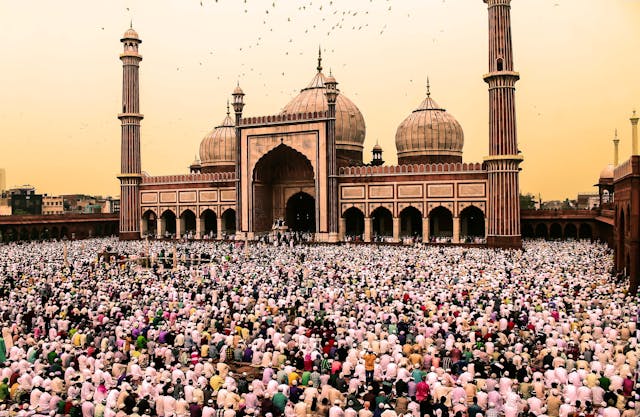Faith in the Modern World: Balancing Tradition and Progress
In today’s fast-paced, interconnected world, faith plays a vital role in shaping the lives of individuals and communities. Whether it’s through religious practices, spiritual beliefs, or moral values, faith continues to offer guidance, purpose, and a sense of belonging. However, as society evolves, the challenge lies in balancing tradition with the demands of modern life. How do we maintain the essence of faith while embracing progress and change? In this article, we’ll explore how faith can thrive in the modern world, balancing time-honored traditions with the values of innovation and progress.

The Role of Faith in the Modern World
A Source of Identity and Purpose
For many people, faith provides a foundation for understanding the world and their place in it. Religious teachings, spiritual practices, and personal beliefs offer a sense of purpose, helping individuals navigate life’s challenges. In the modern world, where values and priorities can often be unclear, faith serves as a moral compass, helping people make decisions and find meaning.
Furthermore, faith provides a sense of community. Religious institutions and spiritual gatherings bring people together, creating a support network that fosters belonging and connection. Whether it’s through shared worship or communal events, faith enables individuals to form strong relationships and find a sense of collective strength.
The Challenge of Tradition in a Changing World
Adapting to Modernity
One of the greatest challenges faith faces today is adapting to the changing social, cultural, and technological landscape. As society becomes more diverse, secular, and technology-driven, traditional religious practices and beliefs sometimes come into conflict with contemporary values. Issues such as gender equality, LGBTQ+ rights, and scientific advancements often present difficult questions for faith communities.
For example, many religious traditions hold specific views on marriage, family, and gender roles that may clash with modern societal norms. Similarly, scientific progress—such as advancements in genetics, artificial intelligence, and space exploration—can raise questions about the compatibility of traditional faith teachings with modern discoveries. These tensions often require religious communities to engage in thoughtful dialogue and reexamine how to stay relevant without compromising core beliefs.
Embracing Progress: The Benefits of Evolving Faith Practices
Integrating Modern Insights with Faith
Despite the challenges, there is potential for faith to evolve and thrive alongside progress. Embracing modern advancements can lead to deeper understandings of faith, creating new opportunities for spiritual growth and connection. Many religious leaders and thinkers are finding ways to integrate modern insights from psychology, science, and philosophy into traditional teachings, enriching the spiritual experience.
For instance, the intersection of spirituality and mental health has gained increasing attention. Faith-based counseling and mindfulness practices, combined with modern psychological research, offer individuals a holistic approach to healing. Faith communities have also embraced technology, with online worship services, digital resources, and virtual study groups making religious practices more accessible to a global audience.
Moreover, the idea of inclusivity is gaining ground in many faith communities. As society progresses toward greater equality, more religious organizations are opening their doors to individuals of diverse backgrounds, recognizing that faith can be a unifying force that transcends differences. This shift helps bridge generational gaps and create more inclusive environments where people can share their beliefs freely.
The Role of Interfaith Dialogue in Modern Society
Fostering Understanding and Unity
As the world becomes more interconnected, interfaith dialogue is essential for fostering mutual understanding and respect between different religious groups. The sharing of ideas and experiences across faiths not only helps to address misunderstandings but also promotes a sense of shared humanity. In a time when division and polarization are prevalent, faith communities can act as bridges, encouraging tolerance and peaceful coexistence.
Interfaith dialogue also provides an opportunity for religious traditions to learn from one another, finding common ground in shared values such as compassion, justice, and peace. Through collaboration, different faiths can support one another in addressing global challenges, such as poverty, climate change, and human rights, reinforcing the idea that faith, in all its forms, can be a driving force for positive change in the world.
The Personal Balance: How Individuals Navigate Faith and Modernity
Finding Harmony Between Tradition and Innovation
For individuals, the process of balancing faith with the demands of modern life can be complex. Many people find themselves at a crossroads, torn between adhering to the customs and beliefs of their religious upbringing and adapting to the modern world in which they live. The key to navigating this balance is finding personal harmony between the two.
One way individuals can balance faith and progress is by incorporating faith-based practices into their daily routines in ways that feel meaningful to them. For some, this might mean attending religious services or observing traditional rituals; for others, it could involve exploring spirituality through personal reflection, meditation, or acts of kindness.
Embracing new ideas and technologies doesn’t necessarily mean abandoning one’s faith. Instead, it’s about expanding the way faith is understood and practiced. For example, some individuals find that their faith strengthens when they engage in social justice work, pursue scientific education, or advocate for environmental sustainability. In this way, faith can be seen not as a barrier to progress but as a guide that helps individuals contribute positively to the world.

Faith as a Force for Social Change
Activism and Social Justice
Faith has historically played a significant role in social justice movements, and today, it continues to drive change on issues like poverty, racial equality, and human rights. Faith-based organizations and leaders have been at the forefront of advocating for the marginalized and oppressed, using religious teachings to inspire action toward a more just and equitable society.
In the modern world, faith is increasingly being integrated into activism, with individuals and groups leveraging their spiritual beliefs to create social change. Religious organizations are working alongside secular movements to address issues such as climate change, refugee crises, and racial inequality, demonstrating that faith can be a powerful force for progress.
Moving Forward with Faith and Hope
The modern world presents both challenges and opportunities for faith. As society evolves, religious traditions must find ways to stay relevant while remaining true to their core values. The key to successfully balancing tradition and progress lies in being open to change, embracing innovation, and engaging in thoughtful dialogue.
Ultimately, faith can continue to offer meaning, guidance, and connection in the modern world. By adapting to the changing landscape without losing sight of what makes faith meaningful, individuals and communities can navigate the complexities of modern life while remaining grounded in tradition. Through faith, we can find hope and purpose as we work together to create a better future for all.












